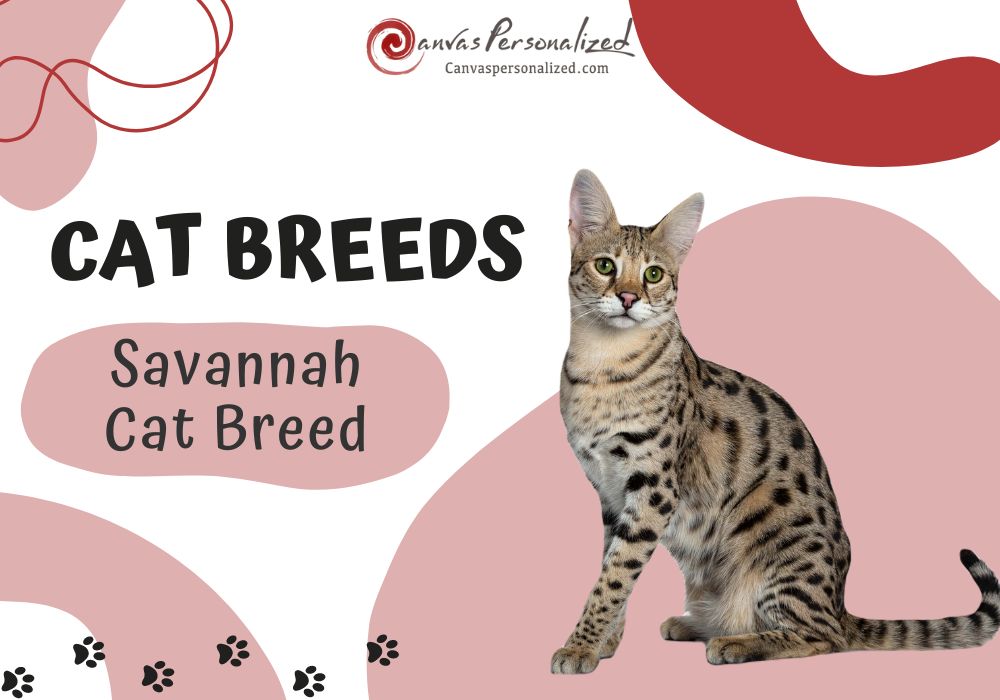The Savannah cat breed might be interesting to you if you want a cat with both the exotic beauty of a wild animal and the friendly attitude of a house pet. This beautiful mix was made by breeding an African serval with a house cat. The result is a tall, skinny, spotted cat that looks like a small cheetah. In this piece, Canvas Personalized will talk about the Savannah cat breed’s history, traits, and care, how to find a good breeder, and what owning one of these amazing animals is like.
1. History of the Savannah Cat Breed
In 1986, a Bengal breeder named Judee Frank successfully produced the first Savannah cat by mating a male serval with a Siamese female. As the first of her kind, the resulting cat, Savannah, piqued the interest of other breeders who sought to produce more of these rare hybrids.
Patrick Kelley, who first obtained a descendant of Savannah, is considered a pioneer of the Savannah cat breed. In 1996, he had the breed standard established and registered with TICA with the support of fellow Bengal breeder Joyce Sroufe. One of the newest and most popular cat breeds, the Savannah, gained championship status with TICA in 2012.

2. The Savannah Cat’s Appearance
The Savannah cat is a beautiful species that resembles a tiny cheetah due to its long, slender build and brilliant spotted coat. Savannahs, with their impressive height of up to 17 inches, are officially recognized as the largest domestic cat in the world. Male Savannahs can get up to 25 pounds, while females are typically much lighter at around 12 pounds. How many generations a domestic cat is from its wild serval progenitor determines how tall and heavy it will be.
Savannahs can have a variety of coat colors, including solid black, brown tabby, silver tabby, and black smoke. Their coat is short and dense, requiring only a simple brushing every week or so to look its best. The eyes of a Savannah cat are another distinguishing feature. The Savannah has remarkable, friendly, piercing eyes: slightly hooded almonds with a dark tear duct line. Coat color often corresponds to eye color. However, this is not always the case.

3. Temperament Traits & Intelligence of the Savannah Cat
Savannah cats have a reputation for being friendly and bright, but their specific personality is determined by their bloodline ratio of serval to domestic cat DNA. Savannah cats are known for their high activity and athleticism; they enjoy running, jumping, and playing. It has been said that a Savannah cat’s temperament is more canine than feline.
Savannah cats are extremely devoted to their owners, although they might be nervous or aggressive with unfamiliar people. They may not actively assault strangers, but they may be withdrawn if they don’t immediately feel comfortable around you. Give your Savannah plenty of chances to interact with others, but remember that he may need some time to warm up to strangers.

4. Savannah Cat Training and Care Needs
Exercise
The long legs and athletic grace of Savannah cats make them good at jumping, and these cats love to fall into high places. Ensure your cat can access a sturdy cat tree or other secure climbing places. Naturally, you can also anticipate your pet to spot high places, like cabinet tops, shelves, and refrigerators, and attempt to climb them. Many cat owners come to accept and even enjoy this peculiar behavior; nonetheless, you should remove any fragile objects from your cat’s reach.
Many Savannahs, like Servals, enjoy splashing around in the water. Don’t just throw your cat into the pool, but rather fill a kiddie pool and let it explore the water at its leisure. With a fence around the pool, they can play outside without worrying about getting away. Just make sure there is shade on hot days in the summer. Savannah cats commonly accept a harness and walk with their owners outside.
>>> Further reading: How to Leash Train a Cat in 5 Brilliant Steps?
Grooming
The Savannah cat is low-maintenance due to its short coat. If you keep your cat indoors, weekly brushing can help prevent hairballs, and regular nail trimming can protect your furniture from sharp claws. Regular dental care for your cat includes brushing and professional cleanings.
Training
It has been said that Savannah cats are canine-like in their eagerness to please and their responsiveness to training. Like dogs, they can be clicker-trained to perform tricks and follow instructions.

5. Food & Diet Requirements
Providing high-quality cat food, especially one high in protein, is the best thing you can do for a Savannah cat’s nutrition. If your cat is active, feeding it a high-protein diet will help it maintain healthy body weight and toned muscles. Cats that enjoy high jumps and water play will benefit greatly from this.
It’s also crucial that your Savannah get a diet suitable for its age. Kitten food, for instance, often contains various nutrients that promote healthy growth and development. They also come in more manageable kibble sizes. Similarly, older cats have unique nutritional needs and may benefit from softer or smaller kibble.
Finally, ensure you’re feeding it according to the instructions on the package. Feeding your cat an appropriate quantity regularly based on its weight will help it keep on weight. Unless told to do so by your vet (for instance, if your cat is overweight or underweight), stick to the feeding guidelines listed on the container.
6. General Health Problems
Although Savannahs are generally healthy, they still require regular checkups at the vet and appropriate preventative care. However, they have an increased risk of hypertrophic cardiomyopathy compared to completely domestic cats. Left ventricular hypertrophy is progressive swelling of the heart’s left ventricle. It’s also important to note that hybrid male sterility is common until the F4 generation.

7. Are These Cats Good for Families?
The social and playful nature of Savannah cats makes them ideal family pets. Due to their big size and playful behavior, these cats should be monitored closely whenever they are near young children.
Your cat may play in a way that is too rough for a young child, or your cat may accidentally knock over a youngster. Teaching a young child appropriate cat behavior is essential, as is making sure that child is never left alone with the cat, especially in an unsupervised outdoor environment.
8. Finding a Reputable Breeder
You should look at several breeders to get a Savannah cat. Some breeders may sell unhealthily bred kittens, inadequately socialized, or even illegally obtained. Look for a breeder member of TICA or another reputable cat association who breeds by the guidelines set forth by that organization.
You should also visit the breeder’s house to meet the cats’ parents. The breeder’s breeding program, health testing, socialization techniques, contracts, and guarantees should all be discussed in detail. You should also look up reviews online and request customer references from prior customers.
It’s best to steer clear of breeders who offer kittens that are too young (less than 12 weeks old), too inexpensive (less than $1,500), or too exotic (F1 or F2 without a permit). You should also avoid breeders who don’t document the kittens’ health, ancestry, or registration. It’s also not a good idea to buy a kitten sight unseen from any source, whether a pet store, a backyard breeder, or an online ad.
| Name | Location | Phone | Website |
| Select Exotics | Illinois | (815) 405-4111 | https://savannahcatbreed.com/ |
| Monterey Savannahs | California | (831) 917-2879 | https://www.montereysavannahs.com/ |
| Artemis Savannah Cats | Texas | (512) 633-5243 | https://www.artemissavannahs.com/ |
>>Read more:
- Unveiling Bombay Cat Breed: Black Beauty with a Gentle Soul
- Oriental Longhair Cat: A Stunning Feline With Captivating Personality
The Savannah cat breed is a unique and interesting way to enjoy a cat if you want to see the wild beauty of the wild in the comfort of your home. If you decide to bring one into your home, it’s important to have the space, time, and money to properly care for a Savannah cat. You can have an extraordinary bond with your Savannah cat if you give it lots of love, care, and attention.










